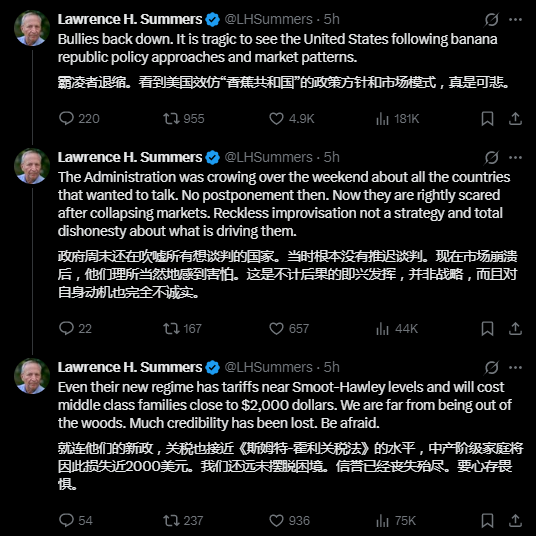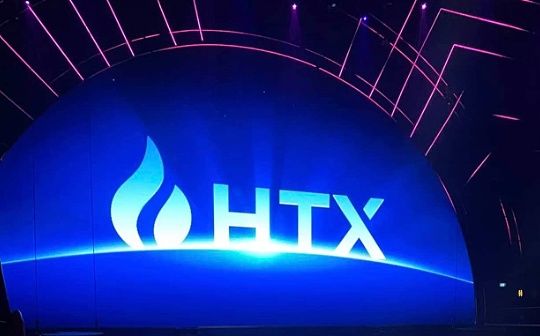
Trump turned 180 degrees and partially withdrew his tariff policy. What happened?
Due to market concerns and pressure from multiple parties, according to the Shanghai Securities News, during the trading session of US stocks on April 9, Eastern Time, US President Trump posted on social platforms that he had authorized to implement a 90-day tariff suspension measure on some countries, significantly reducing tariffs to 10% during this period.
US stocks soared, and the rise of the three major US stock indexes expanded rapidly. The Nasdaq’s gains expanded to more than 10% at the end of the trading session, the S&P 500 rose more than 9%, and the Dow Jones rose nearly 3,000 points and nearly 8%.
Faced with a strong rebound in the market, Trump then posted on his social media platform Truth Social, saying: “I guess they would say this is the most important day in financial history.”
Compared with his previous firm attitude, Trump’s concession is a shocking turn, with Trump aides having argued that he is seeking to reshape the global economy in the past few days.
Critical moments from Tuesday evening to Wednesday afternoon
From Tuesday evening to Wednesday afternoon, Trump and his trade advisers spoke with several Republican lawmakers and top foreign leaders, who expressed concern over turmoil in global markets and growing concerns about a global recession, urging him to take action.
According to media compiled information, Trump’s public activities within these 18 hours are as follows:
Trump spoke for more than an hour on a telephone conversation with a group of Republican senators on the show after Fox News Sean Hannity’s 9 o’clock show ended Tuesday night, with some senators voicing concerns about tariffs.
On the evening of the same day, Trump said he was concerned about the uneasiness in the bond market.
On Wednesday morning, Trump met with Senate Majority Leader John Thune at the White House and had a 25-minute call with Swiss President Karin Keller-Sutter to negotiate tariff policies.
At 8 a.m., Trump watched a news interview with JPMorgan CEO Jamie Dimon.Dimon warned on the show that the recession is a “possible result” given economic uncertainty.
At 9:33 a.m., Trump posted on Truth Social to “stay calm”, and then added that “now is a good time to buy.”
At the same time, U.S. Commerce Secretary Lutnik received a call from the EU’s top trade official Maros Sefcovic, who approved countermeasures against U.S. steel and aluminum tariffs on the same day.
By noon Wednesday, Lutnik had sat in the Oval Office of the White House with U.S. Treasury Secretary Bescent Bescent, and began discussing the latest tariff policy with Trump.
At 1:18 pm, Trump announced a decision to suspend tariffs on Truth Social.
This sudden turn even caught some high-level officials off guard.After Trump posted the post, his aides immediately stood up to discuss how to continue, and Becent and White House press secretary Levitt quickly held a press conference.
After announcing the suspension of tariffs, Trump told reporters that he had been considering changing courses for the past few days and ultimately decided “maybe it came out early this morning.”
The transformation came too suddenly, and there seemed to be differences within the White House
Despite official claims of unity, there seems to be a different voice within the White House.
After Trump’s announcement, White House aides gathered to discuss the facts and points of Trump’s new conception plan.But afterwards, White House staff remained unclear about the key details of the new arrangement.
Peter Navarro, a long-time trade adviser, had urged Trump to pursue radical tariff policies, but he was not mentioned in a press conference.
But shortly after Trump announced the news, Navarro said in an interview that he and the team worked well and claimed he was not marginalized.
When Trump spoke to reporters in the Oval Office, he confessed his broader strategy, saying that many times it wasn’t considered a negotiation until the end of the negotiations.
Although the market is excited, former US Treasury Secretary Summers, known as the “U.S. high inflation whistleblower”, said that he was far from being out of danger and recklessly “imperial” was not a useful strategy. After multiple markets collapsed, the Trump administration is now frightened:
Even their new policy, tariffs are close to the level of the Smut-Holly Tariff Act, and middle-class families will lose nearly $2,000.We are far from getting out of the way.The credibility has been lost.Be afraid.
(U.S.) government is still boasting about countries that want to negotiate over the weekend.Negotiations were not postponed at that time.Now that the market collapses, they are rightly scared.This is reckless improvisation, not strategic, and totally dishonest.
The bully retreated.









